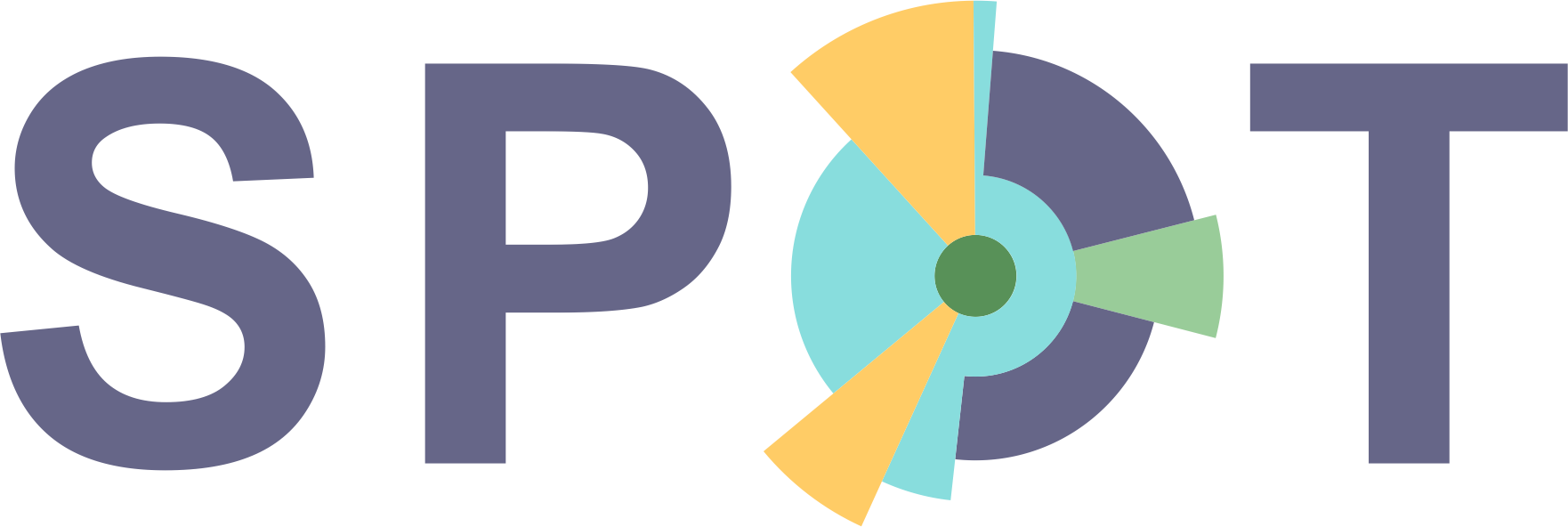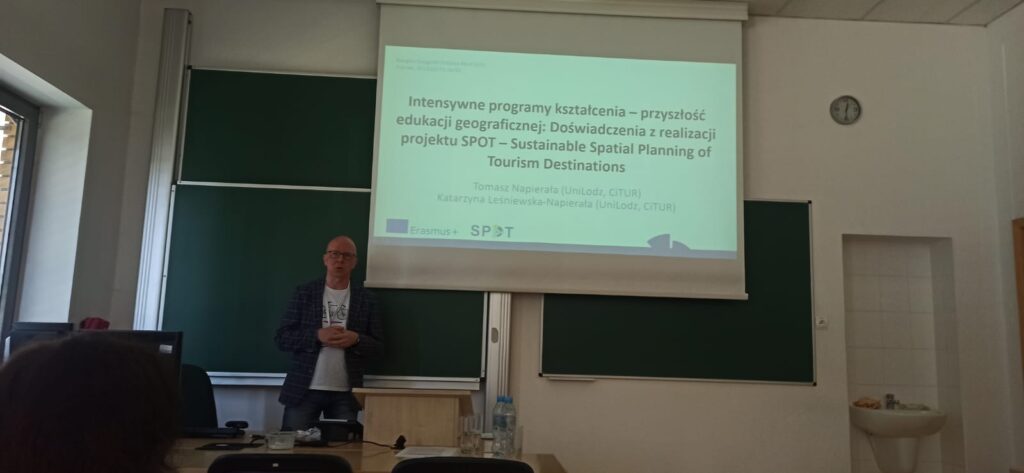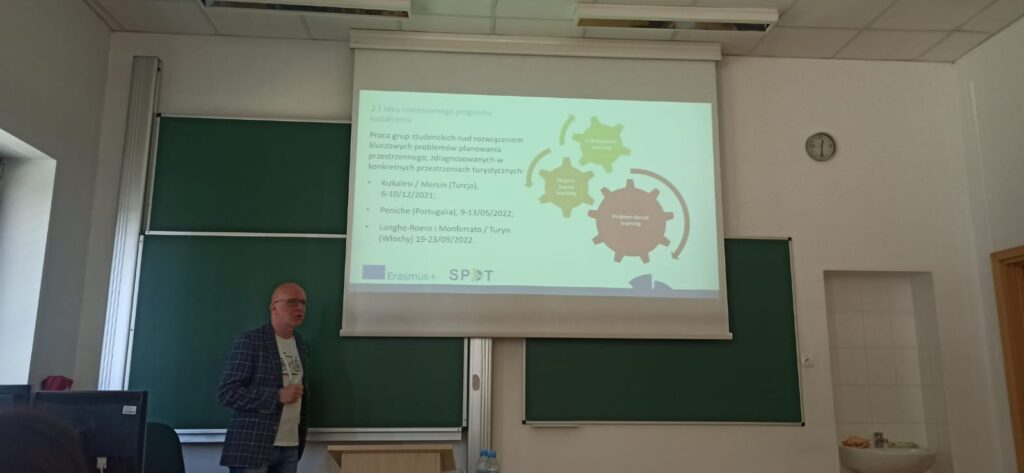On Friday, June 2, 2023, Tomasz Napierała presented educational achievements and experiences of the project SPOT – Sustainable Spatial Planning of Tourism Destinations, during the educational session of the Congress of Polish Geography. The goal of the presentation was to assess the potentials of intensive study programmes for the future development of geographical, tourism, and spatial planning education. The presentation was prepared by Tomasz Napierała and Katarzyna Leśniewska-Napierała (both affiliated to the University of Lodz).
The idea of intensive study programmes – study visits of the SPOT project
Three study visits were carried out during the SPOT project in three different locations and dates: 1) Mersin (Turkey) – December 6-10, 2021, 2) Peniche (Portugal) – May 9-13, 2022, and 3) Turin (Italy) – September 19-23, 2022. From the educational perspective, all of them should be considered as intensive study programmes. The study visits were attended by students representing five different universities: University of Lodz (Poland, leader of the SPOT project), Inland Norway University of Applied Sciences (Norway), Mersin University (Turkey), Politécnico de Leiria (Portugal), and Politecnico di Torino (Italy). The scientific partner of the project was the Institute of Geography and Spatial Organization of the Polish Academy of Sciences.
The purpose of each study visit of the SPOT project was to involve students in delivering solutions for spatial planning issues identified in tourist destinations, and to increase the sustainability and resilience of the investigated areas. These study visits were based on the ideas of collaborative learning, problem-based learning, and project-based learning. The optimal programme of the study visit developed during the SPOT project consists of:
- day 1 – reception of participants; lectures introducing and explaining the problem to be solved by students; task assignment and grouping of students and tutors;
- day 2 – visit to the research area; focus group interview with stakeholders of the research area;
- day 3 and 4 – workshops: stakeholder analysis (using GIS), participatory SWOT analysis, policy recommendations writing; teamwork of students to deliver an assignment;
- day 5 and after the study visit – students’ presentations for the stakeholders of the research area; review, revision and publication of students’ reports.
Focus group interview was the method used to assess the educational effectiveness of intensive study programmes. Interviews were conducted with all students who participated in the study visits. The purpose of the interviews was not only to assess the educational effectiveness of the SPOT project’s study visits – intensive study programmes, but also to develop it. As a result, the learning outcomes increased from visit to visit.
What have the students learned during the SPOT project study visits?
They could increase the knowledge about the spatial planning system of the research area, but also about the geography of the study area. Students appreciated better understanding of the culture of the study area, but also of cultures of places where other students came from. After study visits they emphasized better understanding of the core concepts like sustainable development, sustainable tourism, and sustainable spatial planning. Young people appreciated the information about the role and importance of international institutions in the development of sustainable tourism or sustainable spatial planning (e.g., European Commission, UNESCO).
What skills and competencies have the students developed thanks to participation in the SPOT intensive study programmes?
They observed increase of their skills needed for efficient teamworking. Increase of both English language skills and intercultural competences were appreciated by the students. Teamworking in international group allowed students to understand how to better organize their working time as the team, and individually within the team. Also, students increased their ability to work under time pressure. The character of the study visits (‘locals talking’ sessions and local seminars) allowed students to better cooperate with stakeholders in the research area. The SPOT project’s focus on research excellence made students eager to integrate scientific approach with the practice of sustainable spatial planning, and to use an integrating, interdisciplinary approach based on methodological triangulation to solve assigned task.
What was the biggest challenge for students participating in the SPOT project’s study visits?
Students complained about differentiation of students’ opinions when making key group decisions. For some students it was quite frustrating when they identified different degree of commitment, skills (including language skills) and knowledge of students working in a group. They also complained about different degree of involvement and different styles of work of tutors. Limited free time and limited time for field work were quite challenging for the students. But, the biggest challenge resulted from the complexity of real spatial planning issues diagnosed in the selected tourism destinations.
What is the opinion of students on the teaching methods used during intensive study programmes?
Students underlined that teaching content, especially reports describing problem to be investigated and solved, must be available to students much before the intensive study programmes. Lectures make sense only when are used as an introduction. Lectures can be used to describe both theoretical fundamentals and empirical knowledge about the investigated problem. Finally, workshops make sense when used to directly support students in their work. Workshops must be arranged in a specific order, consistent with the process of problem solving.
What is expected role of tutors of students’ groups?
Intensive study programmes organised within the framework of the SPOT project allowed to better understand the efficient role of tutors in collaborative, problem-based, and place-based learning. The presence and support provided by tutors of student groups was crucial during study visits. Students expected support mostly when preparing for a meeting with the stakeholders of the research area, and when applying various methods to deliver assignment. The expected role of tutors is to support and stimulate students in their work, but without imposing their own ideas and criticizing students’ thinking.
Is involvement of stakeholders of the research area important?
Definitely yes, the involvement of stakeholders was very motivational for students. They realized that when solving an existing, real problem, the results of their work could contribute to local communities, and support particular people. The biggest challenge for students is to share negative opinions about the activities of particular stakeholders when presenting diagnosis and strategy for future actions.



